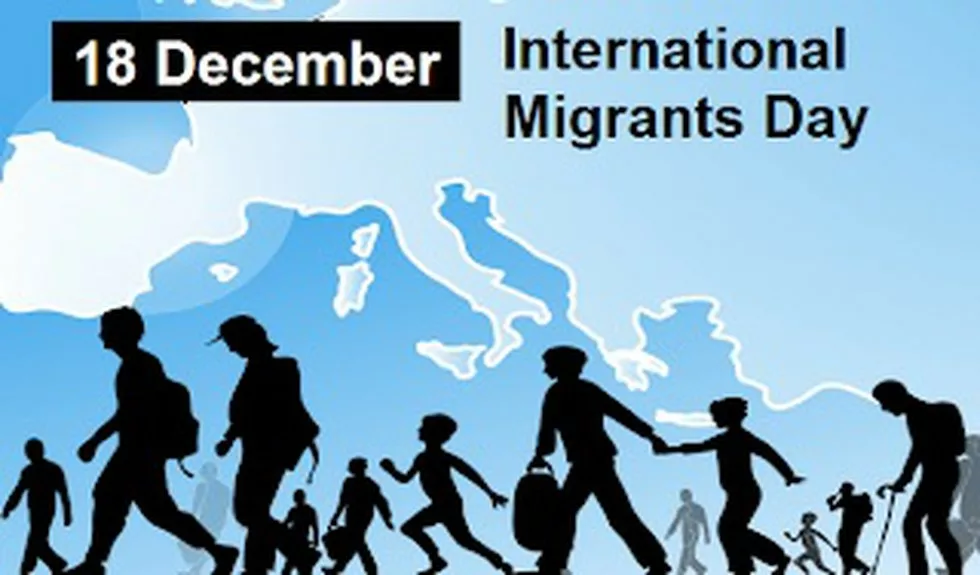As the international community marks Migrants Day tomorrow, it is important to strip the term of its negative connotations for the simple reason that people who find themselves in such situations contribute with their knowledge, networks, and skills to build stronger, more resilient communities. Experts argue that global social and economic landscape can be shaped through impactful decisions to address the challenges and opportunities presented by global mobility and people on the move.
The entire world is enjoying the razzmatazz of the World Cup currently going on in Qatar. But has anyone stopped to ponder that without the skills of 30,000 migrant workers, maybe, those state-of-the-art stadia and hotels might not have been a reality? The Supreme Pontiff of the Catholic Church, Pope Francis, is an Italian by ancestry. His father, an Italian, was a migrant worker in Argentina where he naturalised. These are some of the positive indications that being a migrant is not bad after all. That is why the Global Compact for safe, orderly and regular Migration (GCM) offers an opportunity and guidance to actualise human mobility and seize the opportunities it presents.
Curiously, today, the word migrant is associated with all manner of pejorative thoughts from prostitution to drug trade and human trafficking. Recently, conflict, insecurity, economic circumstances and the effects of climate change, have heavily contributed to the forced movement whether within countries or across borders. In 2020 over 281 million people were international migrants while over 59 million people were internally displaced by the end of 2021.
Regardless of the reasons that compel people to move, migrants and displaced people have come to represent some of the most vulnerable and marginalised groups in society, and are often exposed to abuse and exploitation, have limited access to essential services including healthcare, and are faced with xenophobic attacks and stigma fueled by misinformation.
Due to persistent lack of safe and regular migration pathways, millions continue to take perilous journeys each year. Since 2014 more than 50,000 migrants have lost their lives on migratory routes across the world.
Despite this, migrants have proven to be a source of prosperity, innovation, and sustainable development to countries of origin, transit, and host countries. Their financial contribution through remittance offers a lifeline to families and spur local markets especially those of low- and middle-income countries while their role in the labour market remains invaluable as evident on the frontline of the COVID-19 pandemic response.
An instance of this can be gleaned from a report which indicated that in the first half of 2022, between January and June, Nigeria received $10.11 billion as diaspora, a fanciful word for migrant, remittances. This represents a 9.6 per cent increase when compared to $9.23 billion received in the corresponding period of 2021.
To this extent, therefore, it is the opinion of this newspaper that strengthening the contribution of migrants to sustainable development requires collective effort to improve the governance of migration and addressing the challenges migrants face.
The United Nations Secretary General, António Guterres, made a valid point when he stated that there is no migration crisis; there is a crisis of solidarity. He averred that what the world needs is to expand and diversify rights-based pathways for migration and address labour market shortages.
As the global community marks International Migrants Day, it is pertinent to reflect on the lives of the over 280 million people who left their country in the universal pursuit of opportunity, dignity, freedom, and a better life. This is urgent because it has come to be acceptable that migration is a powerful driver of economic growth, dynamism, and understanding.
However, an unregulated migration along increasingly perilous routes – the cruel realm of traffickers – continues to extract a terrible cost. Over the past eight years, at least 51,000 migrants have died – and thousands more have disappeared. Behind each number is a human being – a sister, brother, daughter, son, mother, or father.
It is important to emphasise that migrant rights are human rights. They must be respected without discrimination – and irrespective of whether their movement is forced, voluntary, or formally authorised. The world must act in unison to prevent the loss of life – as a humanitarian imperative and a moral and legal obligation. In dire situations as are prevalent on high seas, in the deserts and other perilous routes, it becomes urgent to provide for search and rescue efforts and medical care.
Beyond this, the international community owes itself an obligation to expand and diversify rights-based pathways for migration – to advance the Sustainable Development Goals and address labour market shortages. This, therefore, requires greater international support for investments in countries of origin to ensure migration is a choice, not a necessity.
Today and every day, countries of the world ought to desire to safeguard common humanity and secure the rights and dignity of all. This has become increasingly urgent as terrorism, conflicts and climate change create pools of Internally Displaced Persons (IDPs) in countries like Nigeria.





